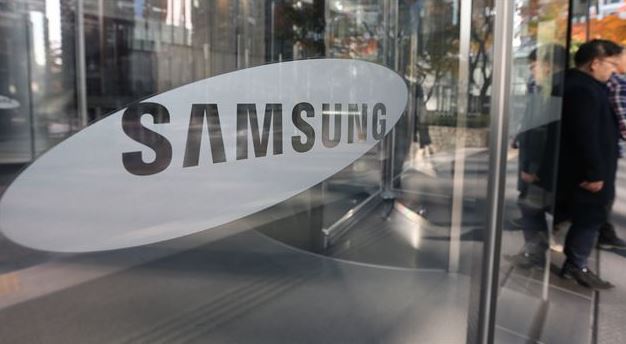Samsung's Q4 operating profit tumbles 28.7% on tepid memory demand
By YonhapPublished : Jan. 8, 2019 - 09:22
Samsung Electronics Co. said Tuesday its operating profit plunged 28.7 percent in the fourth quarter compared with a year ago due to weak memory demand, falling far short of market expectations.
Operating profit came to 10.8 trillion won ($9.66 billion) in the October-December period, the South Korean tech behemoth said in a regulatory filing. This is down 38.5 percent from 15.1 trillion won posted a quarter earlier.
Operating profit came to 10.8 trillion won ($9.66 billion) in the October-December period, the South Korean tech behemoth said in a regulatory filing. This is down 38.5 percent from 15.1 trillion won posted a quarter earlier.

The operating profit was the lowest since the first quarter of 2017.
Sales fell 10.6 percent on-year to 59 trillion won over the cited period, the company said.
The operating profit was far below market expectations of 13.6 trillion won, based on the survey conducted by Yonhap Infomax, the financial arm of Yonhap News Agency, on 23 South Korean brokerage houses.
Samsung did not announce the net profit for the fourth quarter, nor the performances of respective business divisions. The finalized earnings report will be announced later this month.
For 2018, the company expected the operating profit and sales to reach 58.9 trillion won and 243.5 trillion won, respectively, on the back of strong demand for memory chips in the global market.
The sales estimate is the record-high annual figure.
Samsung said demand for memory chips in the last three months of 2018 hovered far below the market expectation as major data centers adjusted their inventories, which drove down prices of DRAM products.
Sales of smartphones also slowed in the maturing market with promotion costs in the peak season cutting into its profitability, it noted.
"Operating profits sharply decreased due to lackluster demand in the memory division and intensifying competition in the smartphone sector," Samsung Electronics said in a rare release for a preliminary earnings report.
The world's largest memory and handset maker expected the earnings to remain weak in the first quarter due to the tepid chip demand but was positive about the business prospects in the latter half of the year.
"Memory demand will rebound in the second half with the release of new CPUs and smartphones," the company said. "In the mid and long term, the supply and demand will be in balance as technical barriers and capital intensity will put pressure on the supply side."
To find new growth drivers, the company said it will accelerate innovation in the emerging sectors, including the 5G networks, artificial intelligence and OLED technologies.
"As more smartphones are expected to have OLED panels, the display business will explore ways to diversify its market," it noted.
The prices of DRAM, a type of memory used for the temporary storage in computer systems, sank 10 percent in the fourth quarter from the previous quarter due to weak demand for PCs, servers and smartphones, according to corporate tracker DRAMeXchange.
DRAMeXchange forecast the total capital expenditure for DRAM production at about $18 billion in 2019, a 10 percent drop from a year earlier.
Industry watchers attributed the earnings shock to weak demand for DRAMs by data center servers and stagnant growth of handset sales in line with the flattening smartphone market.
Apple last week downgraded its sales forecast for the last three months of 2018, suggesting a drop in orders for Samsung, one of the major chip providers for iPhones.
South Korea's semiconductor exports, dominated by Samsung Electronics and its smaller rival SK hynix, dropped 17 percent on-year to $8.86 billion in December, according to the government data.
"The global data center servers temporarily suspended their DRAM purchases, and demand for new IT products in China and emerging markets fell below the market expectation," Lee Jae-yoon, an analyst at Yuanta Securities, said.
Analysts projected downbeat prospects for the world's largest chip and phone maker in 2019.
"If the weak chip demand is affected by the data centers' temporary inventory adjustment, the business environment will get better in the second half of 2019. But if it's about a shift in the capacity expansion plan in the short term, the situation is different," Lee Seung-woo, an analyst at Eugene Investment & Securities, said. "This year's prospects for the semiconductor industry are shrouded in clouds."
Shares of Samsung Electronics opened higher but traded 0.4 percent down from the previous session as of 11 a.m. The fourth-quarter report was announced before the market opened Tuesday. (Yonhap)







![[Graphic News] More Koreans say they plan long-distance trips this year](http://res.heraldm.com/phpwas/restmb_idxmake.php?idx=644&simg=/content/image/2024/04/17/20240417050828_0.gif&u=)
![[KH Explains] Hyundai's full hybrid edge to pay off amid slow transition to pure EVs](http://res.heraldm.com/phpwas/restmb_idxmake.php?idx=644&simg=/content/image/2024/04/18/20240418050645_0.jpg&u=20240419100350)






![[From the Scene] Monks, Buddhists hail return of remains of Buddhas](http://res.heraldm.com/phpwas/restmb_idxmake.php?idx=652&simg=/content/image/2024/04/19/20240419050617_0.jpg&u=20240419175937)

![[KH Explains] Hyundai's full hybrid edge to pay off amid slow transition to pure EVs](http://res.heraldm.com/phpwas/restmb_idxmake.php?idx=652&simg=/content/image/2024/04/18/20240418050645_0.jpg&u=20240419100350)

![[Today’s K-pop] Illit drops debut single remix](http://res.heraldm.com/phpwas/restmb_idxmake.php?idx=642&simg=/content/image/2024/04/19/20240419050612_0.jpg&u=)